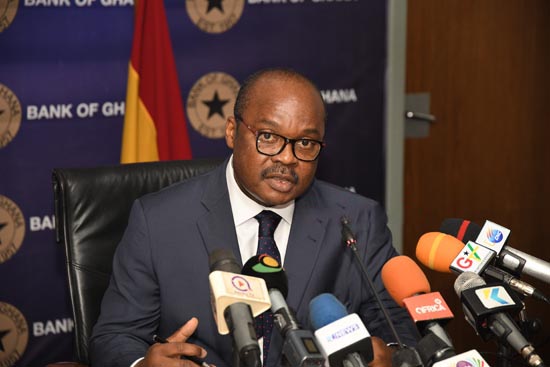Governor of the Bank of Ghana (BoG) Dr Ernest Addison has asked banks and other financial institutions to innovate and be creative in the conduct of business.
He says this will enable the banks to grasp the ongoing adjustments in the Ghanaian economy.
He stated that the Domestic Debt Exchange Programme (DDEP) affected the profitability and solvency of banks in 2022, but the performance of banks during the first half of 2023 looks promising.
“The Bank of Ghana has also granted some temporary regulatory reliefs to dampen the impact of the debt restructuring and these, together with the expected operationalization of the Ghana Financial Stability Fund, should provide adequate support to the banking sector.
“Furthermore, banks whose CAR levels have dropped below the 10 percent minimum due to the DDEP have been advised to provide recapitalisation plans for review,” he said in a statement presented on his behalf by the First Deputy Governor of the central bank Dr Maxwel Opoku-Afari during the launch of the GCB Bank’s 70th anniversary in Accra on Thursday.
Earlier, Dr Addison stated that if the remarkable performance of the banks this year continues, the country would expect banks to rebuild capital buffers quickly in addition to equity capital injections by shareholders to give a further boost to real sector growth and to build resilience of the banking sector.
Speaking at the 113th Moneyray Policy Committee (MPC) press conference in Accra on Monday July 24, he said “Early operationalisation of the Ghana Financial Stability Fund should also help provide additional recapitalisation support for eligible banks in line with the criteria and governance framework agreed with the IMF and the World Bank.”
The restructuring of the local currency and overseas debt last year resulted in the first loss on record for two of the West African nation’s top banks.
GCB Bank Plc, the country’s largest lender by assets, posted a 593.4 million cedis ($50.5 million) net loss for the year to end-December, its first since 1993 when Bloomberg started maintaining data.
Standard Chartered Bank Ghana Ltd., the biggest by market value, reported a loss of 297.8 million cedis.
Banks operating in West Africa’s second-largest economy have taken a hit of about $1.4 billion, according to Bloomberg, as Ghana restructures most of its public debt, estimated at 576 billion cedis.
GCB Bank took a charge of 1.83 billion cedis after impairing its debt securities, while for Standard Chartered Bank Ghana the amount was 173 million cedis.
Ghana’s lenders were allowed a month’s extension to release full-year earnings.


